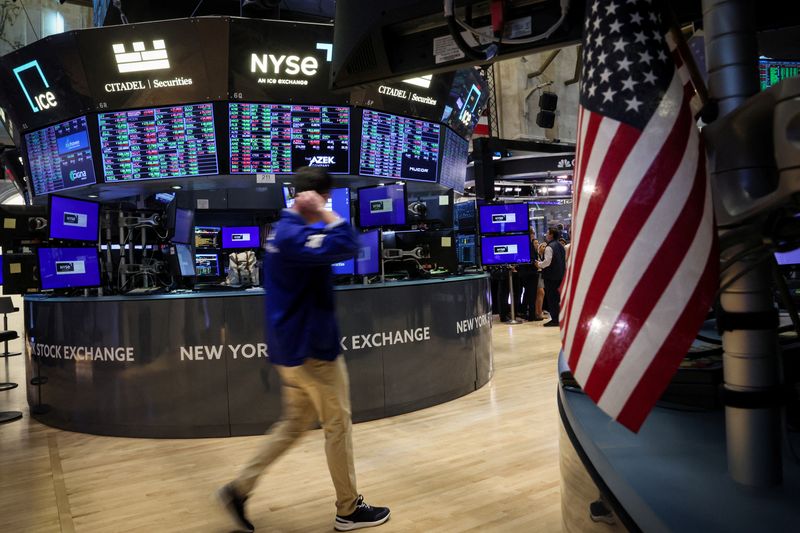By Lewis Krauskopf and David Randall
(Reuters) - From massive U.S. tech stocks to bitcoin, a spasm of economic worries is forcing an unwind of the year’s most popular trades, leaving investors to determine how much more downside could lay ahead.
The rout has sparked some stunning market moves: the S&P 500 is down over 5% since last Wednesday, set for its biggest three-day drop in more than two years. Japan’s Nikkei has tumbled nearly 20% while bitcoin has slid 15%. Meanwhile, popular safe-haven assets such as U.S. government bonds and the Swiss franc have surged.
Some market participants have pointed out that equity weakness often provides a normal reset, especially for a market that had charged ahead for months with little pause. Market pullbacks of 5% or more in the S&P 500 have occurred an average of three times a year since 1936, according to BofA Global Research.
Others, however, believe there is more volatility to come, and urge caution.
“Too much leverage in the global financial system, with Japanese yen strength and overdone Treasury yield declines, (are) a key to the unwind,” Bill Gross, former head of bond giant PIMCO and a closely followed market commentator, said in an email to Reuters. “I’m not buying the small recovery from morning bottoms. Not selling either. Markets (are) too volatile."
Big tech stocks are one area that could be a source of further selling. Even with recent losses, the tech-heavy Nasdaq 100 is up 7% this year. While that run has been fueled by strong earnings earlier in the year and excitement over artificial intelligence, it has also made many of the stocks richly valued and drew comparisons to the dotcom bubble that imploded more than two decades ago.
Valuations remain stretched, even after a recent drop: The S&P 500 was trading at 20.5 times forward 12-month earnings estimates last week, compared with its long-term average of 15.7, according to LSEG Datastream.
Importantly, the Magnificent Seven megacap stocks last month accounted for one-third of the S&P 500, making their fate closely tied to the trajectory of broader markets.
"We would argue that positioning has been a big driver of recent market moves,” said Mohit Kumar, chief economist for Europe at Jefferies. “U.S. equities, particularly the tech sector, was over-owned and some froth needed to be cleared."
Saturday's earnings report from legendary investor Warren Buffett’s Berkshire Hathaway (NYSE:BRKa) has also done little to calm the market’s tech concerns: The conglomerate sold about half its stake in Apple (NASDAQ:AAPL) and let its cash pile soar to $277 billion in the second quarter. Berkshire often lets cash build up when it can't find whole businesses or individual stocks to buy at fair prices.
Another source of volatility has been the unwind of a popular trade in which investors borrowed in Japanese yen to fund bets on a broad range of risky assets, from stocks to high-yielding global currencies. The Japanese yen surged to its highest against the dollar since January.
Jean Boivin, an economist at asset manager BlackRock (NYSE:BLK), said the carry trade was “an anchor in global markets” which was shaken when the Bank of Japan hiked interest rates last week: a move that ended eight years of negative interest rates and spurred the carry trade reversal.
“As we get confirmation that the Bank of Japan is not on a very hawkish path, we will see calm coming back into the global markets,” Boivin said.
A lack of major economic data releases until the consumer price report on Aug. 14 could keep markets on edge in coming days.
Still, some market participants are more than happy to buy on the cheap. Indeed, history is firmly on the side of dip buyers.

Take the Nasdaq Composite, which slipped into a correction - defined as a 10% drop or more from an all-time high - last week. Over the past 44 years, the index has slipped into correction territory after hitting a new high 24 times, or about once every two years, according to a Reuters analysis of LSEG data. In two-thirds of these cases, the index traded higher a month after entering correction territory.
"Sell-offs that manifest themselves through wild swings in the currency markets are sharp and swift, but usually very short lived,” Jamie Cox, managing partner for Harris Financial Group, said in written commentary. "Some say this is overdue; I say use this downturn to pick up some deals."